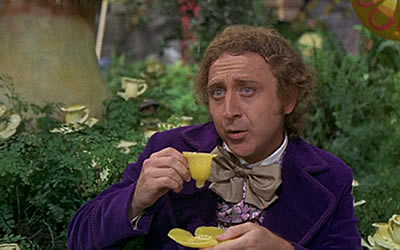My blog will
entail cataloging the various views and intriguing qualities surrounding the
characters, story line, and time period surrounding the 1971 film Willy Wonka and the Chocolate Factory. I am still undecided on how to break up the
four parts, but I will try to make them as distinct as possible.
Common Ideas Between Willy Wonka and Actual Historical Philosophers
Voltaire:
One of the most
prominent quotes that stood out to me was the statement that Willy Wonka made
before entering the "Wonkavision" room: "if the Good Lord had
intended for us to walk, He wouldn't have invented roller skates." This view seems to go along with Voltaire's
criticism of Leibniz, as it was made in response to a boy who said that such a
short distance could have been accomplished on foot. In Candide,
a book written by Voltaire, Pangloss, an overly optimistic philosopher of metaphysico-theologico-cosmolo-nigology
portrayed as someone following Leibniz's creed, makes a similar declaration by
saying, " noses were made to support spectacles, hence we have spectacles." Both are using obviously incorrect statements
to subtly point out the error of an opponent and make fun of them at the same
time.
A funny illustration
of the scene in which Pangloss expresses his view:
http://www.mediabistro.com/galleycat/files/original/candide.asp
Seneca:
Seneca and Willy
Wonka would have gotten together very swimmingly, as both had a similar view on
happiness and living life in general.
Seneca believed that the best life to live was one spent in a solitary,
quiet place where much thinking could be done.
Willy Wonka locks himself up in his factory for years, thinking up new
candies and sweets, devising a radical contest to figure out the subsequent
heir, and studying all the while from myriad sources, Biblical, poetic, or
otherwise. His unique personality is
derived from his reclusiveness and lack of contact with humanity, except through
the strange Oompa Loompas, who seem to have little interaction other than
receiving and carrying out orders. Such
a life would be very lonely in my eyes, and apparently Wonka ended up feeling
the need to pass his empire onto a deserving individual, so I wonder whether
Seneca truly would have been happy with such a depressing outlook.
The lonely life of a reclusive bachelor with only candy for company
Socrates:
From the accounts
still in existence of Socrates, he and Wonka must have had very similar
personalities. Wonka enjoys uttering
small, quick quips at the people he has invited into his factory, and then
confusing and throwing them off guard by asking questions or making statements
contrary to the norm. Socrates liked to
stir up strife by asking questions that people had to take the time to think
through, and in both the chocolate factory and the ancient market people run
into trouble by answering such jabs without thinking through the full
implications thoroughly beforehand.
His propensity
for making such philosophically charged quips allows him to be a much more
dynamic character, if only one delves deeper into the many quote that he states
throughout the movie. I hope to scratch
the surface and uncover some of these in some of my later posts, I hope this
one was enjoyable.
Mason Riley
Word Count: 529
Total Word Count: 529

.jpg)
No comments:
Post a Comment
Note: Only a member of this blog may post a comment.